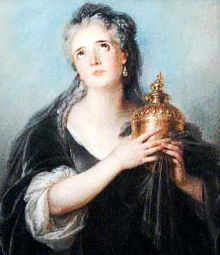 As I was putting together today’s birthday post, I came upon Adrienne Lecouvreur, a French actress during the early 18th century. I had no idea who she was, but she was born in 1692 and it got me to thinking about the laws against women actors in England during the Elizabethan theater. As I recalled, this law was repealed at some point in the middle of the 17th century, but I wasn’t sure when.
As I was putting together today’s birthday post, I came upon Adrienne Lecouvreur, a French actress during the early 18th century. I had no idea who she was, but she was born in 1692 and it got me to thinking about the laws against women actors in England during the Elizabethan theater. As I recalled, this law was repealed at some point in the middle of the 17th century, but I wasn’t sure when.
In my search for that information, I came upon an interesting page on the Yahoo! “answers” subnet. It purported to answer the question, “Were women allowed to act in the theatre in the Shakespereian era?” That questioner wrote, “I remember reading that there was a law in Spain that said they could. But I don’t know if that only covered Spain.”
The answer is that it depends upon the country, but in England, women were not allowed on the stage until 1660. Of course, you wouldn’t know that from reading the Yahoo! “answer.” In fact, the best that anyone did was to know as much as the questioner did. The “best answer” was by user “liz h,” who wrote:
Americans especially like to think the English are now and always have been better than their darker skinned brothers and sisters in Europe. This is not the case. The English are generally every bit as vile and disgusting as everyone else. And when it comes to sins of sexual repression, the English often lead the pack. That was certainly true in terms of their laws about the theater.
Most of Europe was far ahead of England when it came to allowing women on the stage. And the plays of that era were much improved by having woman play the female roles. As Gary Taylor discusses in his fabulous Reinventing Shakespeare, the fact that boys played all the female roles in English plays of that time, generally limited the plays to having two kinds of female characters: nubile women and old hags. The plays of Lope de Vega exhibit a much wider range of characters.
The “best” answer offered by Yahoo! is offensive and it is an example of the danger of the internet’s “polling” approach to the truth. The other answers are just as bad in their own ways. The one person who was aware that women were allowed on the stage in Spain claimed that actors were all disreputable, which is simply not true; the most successful actors were very well connected, being included even in court functions. Another writer thought that England was the only place that had an important theater movement. There was also a common implication that the female parts were played by men. In fact, even the old women characters were played by boys. (I suspect they got most of their information from watching Shakespeare in Love.) In fact, allegations of pederasty was one of the biggest complaints about the theater at that time. (Of course, those people generally wanted to abolish theater, not just transvestite acting.)
It is always disconcerting to see pages like this “answer” on Yahoo! And they make it hard to set the record straight. I’ve tried in the past, and even after registering, I wasn’t able to post anything. But even if I’d accomplished that, my answer would just go to the bottom of the list, where few would even see it. That is part of the brilliance of Wikipedia: when information is presented, it’s out there in front so everyone can see it, and it is a simple matter to fix if it’s wrong. It’s just too bad that there is no “question and answer” interface to Wikipedia.
Afterword
Note also in the “answer” the attack on Spain about the Inquisition. First, it was primarily the Catholic Church that started the Inquisition; it was not specific to Spain. What’s more, it was started in 1480s, not the 1300s. And England was Catholic at that time. And it wasn’t intended to suppress minorities. It was intended to make sure that the converted Jews and Muslims were maintaining the church orthodoxy. Later, of course, they started their “convert or leave” policy. Anyway, liz doesn’t know what she’s talking about, and this stuff has nothing to do with the question.





